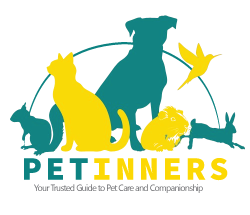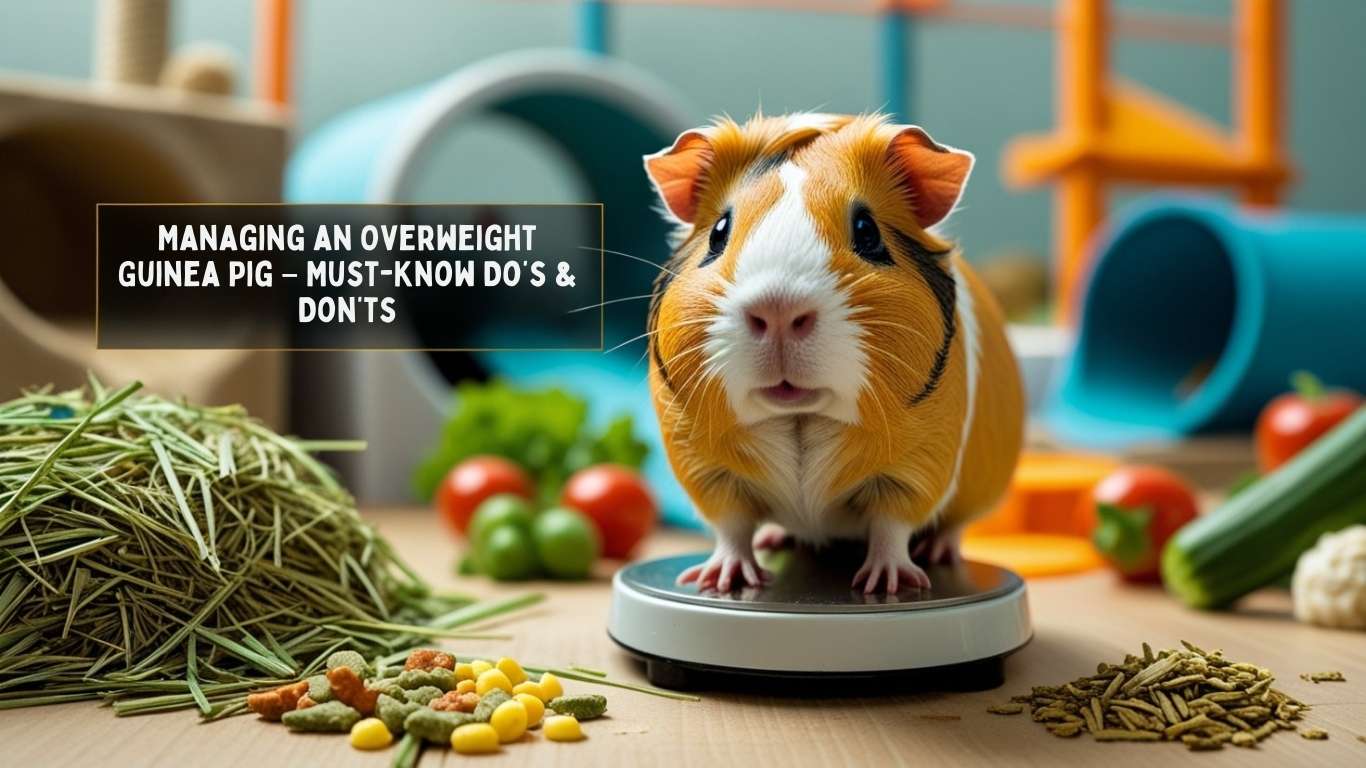Managing an Overweight Guinea Pig – Do’s and Don’ts
Helping your guinea pig reach a healthy weight requires patience, the right diet, and daily exercise. Provide unlimited Timothy hay, reduce pellet portions, and avoid sugary treats while encouraging movement with free-roam time and interactive play. Never resort to crash diets—gradual weight loss is key to their well-being. Regular weight monitoring and vet guidance ensure a happy, active, and healthy guinea pig!
DO:
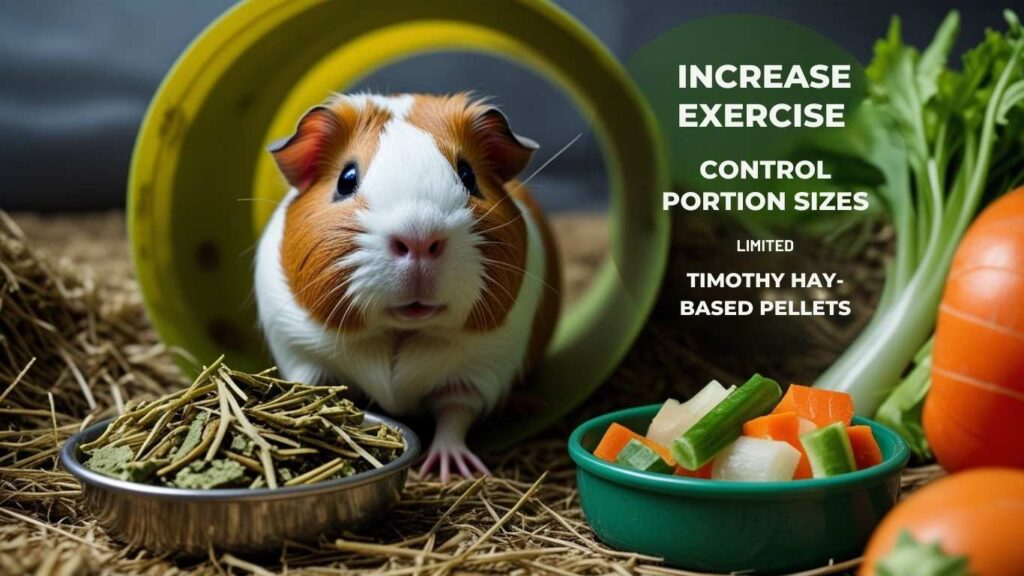
Helping your chubbier guinea pig get back to a healthy weight requires patience and a proper approach. The first step is to choose the right pellets—opt for Timothy hay-based pellets while reducing portion size. At the same time, ensure they have unlimited access to fresh Timothy hay to keep their diet fiber-rich and balanced.
Encouraging more movement is essential for weight management. Allow for longer free roam time in a larger space and make exercise fun with training sessions that teach basic tricks. A stimulating environment helps keep your guinea pig engaged and active.
Key Points for a Healthy Weight Loss Plan:
- Choose high-quality pellets that are Timothy hay-based and cut portion sizes gradually.
- Provide unlimited Timothy hay for continuous fiber intake.
- Increase movement with longer free-roam sessions in a larger space.
- Make exercise enjoyable by using training sessions to teach simple tricks.
- Avoid high-sugar, fattening foods like bananas; instead, offer healthy treats that support slow weight loss.
- Never use crash diets, as they can be harmful to your small pet’s health.
- Consult a vet before making significant dietary changes.
- Keep them hydrated by ensuring constant access to fresh water.
- Adjust serving sizes carefully while maintaining a balance of nutrition and exercise.
By following these steps, your guinea pig can move towards a healthier lifestyle, enjoying more activity and better overall well-being! 🐹✨
DON’T:
Helping guinea pigs lose weight should be done gradually to avoid stress and health risks. A slow and steady approach ensures they stay healthy while shedding extra weight. Timothy hay is essential in their diet, providing fiber to aid digestion and prevent unnecessary weight gain. Keeping their diet balanced and consistent is key to maintaining their well-being.
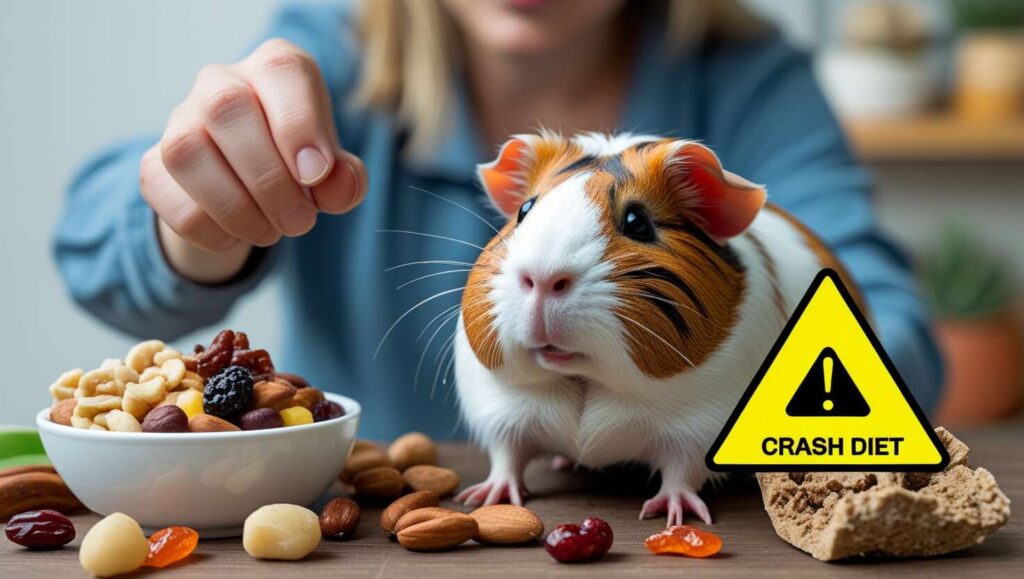
Certain foods can contribute to weight gain and should be avoided. High-calorie foods like nuts, dried fruits, and sugary treats have more calories and less fiber than what guinea pigs need. Crash diets are also extremely dangerous, as making a guinea pig go hungry can lead to serious health issues. Instead, stick to a steady routine, cut back on unhealthy treats, and provide high-fiber hay from trusted pet stores.
DON’Ts When Helping Guinea Pigs Lose Weight:
- Do not rush weight loss—a slow approach is safest.
- Avoid high-calorie foods like nuts, dried fruits, and sugary treats.
- Never put your guinea pig on a crash diet—hunger can lead to severe health risks.
- Stick to normal diets with plenty of Timothy hay for fiber and digestion.
- Reduce unhealthy treats but maintain a balanced and nutritious meal plan.
- Choose high-fiber hay from trusted pet stores to support a healthy diet.
By following these guidelines, you can help your guinea pig lose weight safely while keeping them happy and active! 🐹✨
Is it Possible to Overfeed a Guinea Pig?
Yes, overfeeding a guinea pig can be harmful and lead to health problems like obesity. While unlimited hay is essential for their diet, too many treats, pellets, or store-bought snacks with sugar and unhealthy ingredients can cause issues. Adult guinea pigs should have a nutritious balance of vegetables, fruits, and homemade or reviewing options instead of trash foods like cookies or potatoes. Owners should be researching the best feeding habits, ensuring food is hard enough to help digest, rather than being easily consumed. By carefully reviewing their diet and limiting unnecessary additions, guinea pigs can stay healthy and happy.
Overweight Guinea Pigs: Signs and Risks
An overweight guinea pig is at higher risk for health problems, including diabetes, bloat, and tumors. Excess fat can limit mobility, making it painful for them to walk or stay active. You may notice a bulging abdomen, distension, or sudden weight gain, all of which indicate the need for careful monitoring. Using a gram scale weekly helps track weight trends and prevents potential medical emergencies.
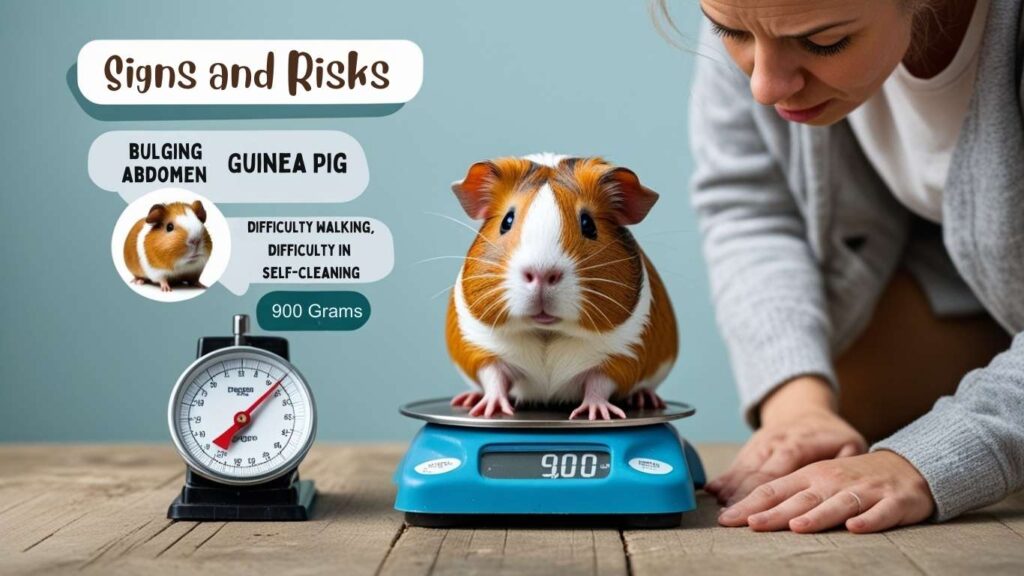
The Pet Food Manufacturers’ Association states that a healthy guinea pig typically weighs between 700 to 1,200 grams. If your guinea pig exceeds 900 grams significantly, it’s best to observe their weight closely and consult a veterinarian to determine if the weight gain is due to a high-carb diet, pregnancy, or an underlying health issue.
Health Risks of Overweight Guinea Pigs:
- Joint strain and mobility issues, leading to difficulty walking.
- Increased risk of flystrike, due to difficulty in self-cleaning.
- Higher chance of diabetes, bloat, and tumors.
- Poor hygiene if they struggle to clean their rear end properly.
- Reduced quality of life, leading to lethargy and discomfort.
How to Manage Their Weight Safely:
- Encourage regular exercise by providing more playtime and a larger enclosure.
- Limit high-carb foods and eliminate sugary treats from their diet.
- Monitor portion sizes to prevent overfeeding.
- Consult a vet for proper guidance on weight management.
- Use tools like the Guinea Pig-Size-O-Meter to assess their condition.
If your guinea pig shows signs of lethargy, rapid weight gain, or struggles with movement, consult a veterinary care professional immediately. Ignoring weight issues can lead to serious health complications, so taking action early can help ensure a longer, healthier life for your furry friend! 🐹✨
Conclusion
Managing your overweight guinea pig requires a balanced diet, regular exercise, and gradual weight loss to ensure their health and well-being. Focus on unlimited Timothy hay, portion-controlled pellets, and reducing high-calorie treats while encouraging movement through free roam time and play sessions. Avoid crash diets and overfeeding, as both can lead to serious health issues. Monitoring their weight regularly and consulting a veterinarian for guidance will help prevent complications like diabetes, mobility issues, and hygiene problems. With proper care and a steady approach, your piggy can achieve a healthy weight, stay active, and enjoy a better quality of life! 🐹✨
